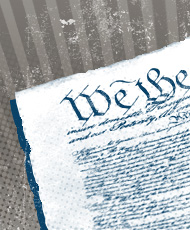Supreme Court To Hear Challenge To Law That Inhibits Work Of Humanitarian Organizations

ACLU Filed Brief On Behalf Of Carter Center And Other Organizations Supporting Challenge To Vague "Material Support" Law
FOR IMMEDIATE RELEASE
CONTACT: (212) 549-2666; media@aclu.org
NEW YORK – The United States Supreme Court will hear arguments Tuesday in a case challenging the constitutionality of a law that hinders the ability of human rights and humanitarian aid organizations to do their work by making it a crime to provide "material support" to designated "foreign terrorist organizations" (FTOs). The American Civil Liberties Union filed a friend-of-the-court brief in the case, Holder v. Humanitarian Law Project, on behalf of the Carter Center and several other organizations known for their work to promote peace, further human rights and alleviate human suffering around the world. The brief charges that the vague language of the law could prohibit the speech and advocacy of groups whose only purpose is to promote peace and deter terrorist activity.
Under the challenged law, individuals face up to 15 years in prison for providing "material support" to FTOs, even if their work is intended to promote peaceful, lawful objectives. "Material support" is defined to include any "service," "training," "expert advice or assistance" or "personnel." The vague language potentially criminalizes the humanitarian organizations' efforts to persuade violent actors to renounce violence or cease their human rights abuses, and jeopardizes the provision of aid and disaster relief in conflict zones controlled by designated groups.
The following can be attributed to former President Jimmy Carter, founder of the Carter Center:
"Our work to end violence sometimes requires interacting directly with groups that have engaged in it. Unfortunately, efforts like ours, and those of the many other human rights groups who signed onto this brief, are hindered by the extremely vague 'material support' law that leaves us guessing whether our work to encourage peace could actually be considered illegal. Sadly, the law being challenged in court – which is aimed at putting an end to terrorism – actually threatens the work of humanitarian groups that share the same goal. We hope the Supreme Court will overturn this law so that groups like ours can continue the important work of advancing peace and freedom without concern of prosecution."
The following can be attributed to Melissa Goodman, staff attorney with the ACLU National Security Project:
"People engaged in conflict resolution and human rights advocacy shouldn't have to be constantly questioning whether their work could land them in prison. Unfortunately, that is the inescapable impact of this law. The government should not be in the business of criminalizing speech meant to promote peace and human rights."
Organizations that signed onto the ACLU's brief are the Carter Center, Christian Peacemaker Teams, Grassroots International, Human Rights Watch, International Crisis Group, the Institute for Conflict Analysis and Resolution at George Mason University, the Kroc Institute for International Peace Studies at Notre Dame University, Operation USA and the Peace Appeal Foundation.
The brief is available online at: www.aclu.org/national-security/amicus-brief-carter-center-and-other-humanitarian-groups-support-humanitarian-law-

